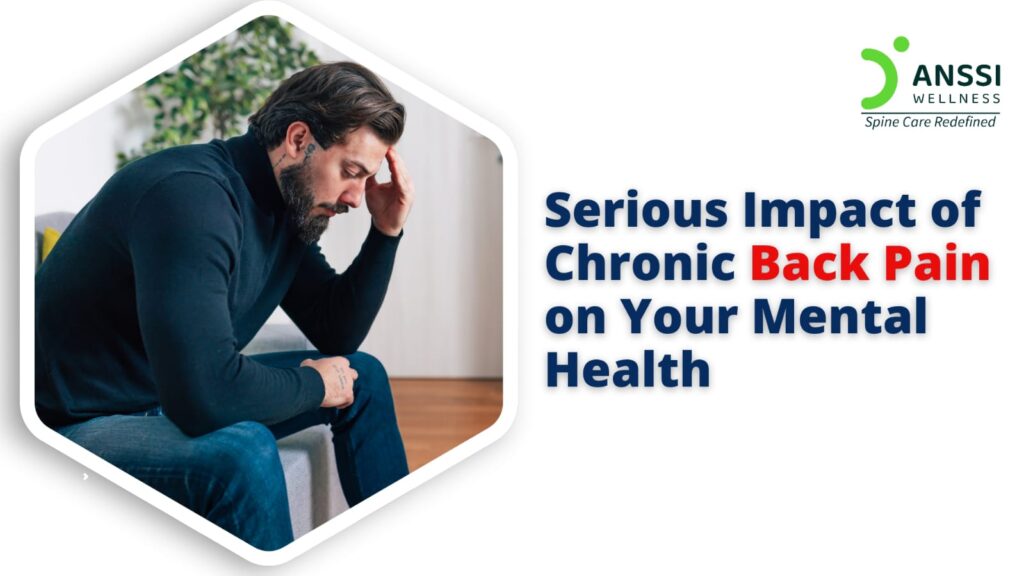Back pain is one of the most common health challenges worldwide that impacts millions of individuals daily.
If you are suffering from chronic back pain, along with its physical implications, its effects on your mental health deserve attention. In return, there are psychological factors that can make your chronic pain issues much worse.
Impact of Chronic Back Pain on Mental Health
Chronic back pain is more than just a physical ailment; it’s a condition that can disrupt your emotional and psychological well-being.
Living with persistent pain often leads to frustration, irritability, and hopelessness. Over time, these feelings can escalate into more serious mental health issues such as anxiety and depression.
Depression and Chronic Pain
Research shows that individuals with chronic back pain are at a higher risk of developing depression. The constant discomfort can lead you to feel helpless, reducing the quality of life and making your daily tasks feel impossible.
This may leave you vulnerable to depression, which in turn, lowers the threshold for pain perception. In the end, you may get stuck in a vicious cycle of pain and emotional distress.
Anxiety and Fear-Avoidance
Anxiety is another common companion of chronic pain. You may develop a fear of movement or physical activity, worried that it may worsen your condition. This “fear-avoidance” behaviour can lead to muscle deconditioning, making the pain worse and contributing to a cycle of anxiety and physical deterioration.
Sleep Disruption
Back pain can interfere with your sleep, leading to fatigue and irritability. Poor sleep quality is directly linked to worsened mental health outcomes, including increased stress levels and reduced emotional resilience.
How Mental Health Affects Back Pain?
The relationship between back pain and mental health is bidirectional. Just as pain can influence the mind, the state of your mental health can significantly impact the physical symptoms you experience.
Stress and Muscle Tension
Psychological stress is known to cause muscle tension, particularly in the back and shoulders. If you are experiencing prolonged stress that can lead to chronic tightness, making your back pain worse. Additionally, stress hormones like cortisol can heighten inflammation, further aggravating pain symptoms.
Cognitive and Emotional Factors
Negative thought patterns and emotional distress can amplify the perception of pain. If you keep excessively focusing on your discomfort or see your condition as worse than it actually is, it can intensify the experience of pain.
Social Isolation and Its Effects
Mental health struggles often lead to social withdrawal, which can reduce access to support systems. If you lack emotional and practical support at this stage, it can exacerbate feelings of loneliness, making the experience of chronic pain feel even more overwhelming.
Breaking the Cycle
If you want to address the interplay between back pain and mental health, you’ll need a holistic approach:
- Physical Interventions: Non-surgical therapies like spinal decompression treatment, can alleviate physical symptoms and improve mobility.
- Psychological Support: Cognitive-behavioural therapy (CBT) and mindfulness practices can help you manage your emotional responses to pain.
- Lifestyle Modifications: Regular exercise, healthy sleep habits, and stress management techniques can benefit both physical and mental health.
Understanding the intricate link between back pain and mental health is crucial for effective treatment. By addressing both aspects simultaneously, you can achieve a better quality of life, breaking free from the pain-mental health cycle.
About ANSSI:
ANSSI Wellness focuses on improving the quality of life for patients suffering from spinal issues, aiming to provide relief where other conventional treatments have failed. Through advanced nonsurgical spinal decompression treatment, ANSSI is committed to helping patients avoid surgery and recover in a safe, effective, and compassionate environment.



